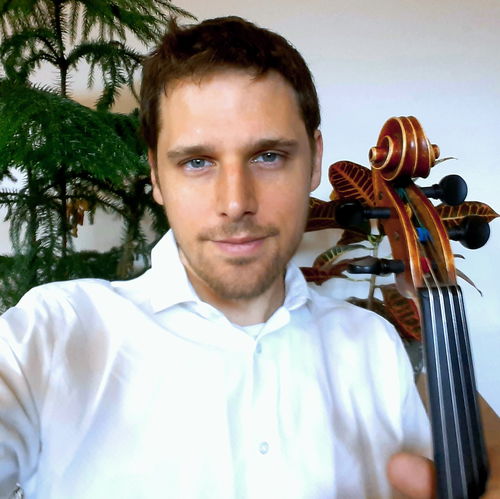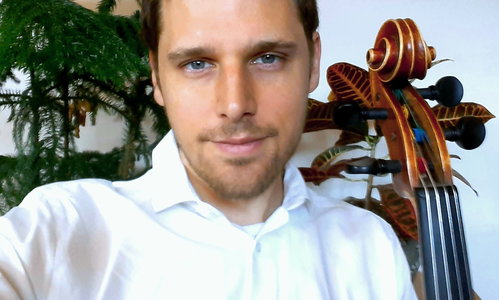Viennese Involution
Details
Rudy Hasspacher full profile / String Quartet / 4 musicians
Other players: Yuriy Geyer, Pascal Innocenti, Tim Archbold
Full program notes
The Iridescent Zeal String Quartet presents:
Viennese Involution
Yuriy Geyer, violin
Pascal Innocenti, violin
R Rudolph Hasspacher, viola
Juan Horie, cello
String Quartet in B-flat major, “Sunrise” Op.76 No.4 (1796-97)
Franz Joseph Haydn (1732-1809)
I. Allegro moderato
II. Minuet, presto
III. Andante
IV. Finale
String Quartet No.6 in B-flat major, Op.18 No.6 (1800)
Ludwig van Beethoven (1770-1827)
I. Allegro con brio
II. Adagio ma non troppo
III. Scherzo Allegro – trio
IV. La Malinconia Adagio
V. Allegretto quasi Allegro
Franz Joseph Haydn is known as both the “Father of the Symphony” and the “Father of the String Quartet,” having written 106 symphonies and 68 string quartets in his long and widely celebrated career. He accomplished a large portion of these compositions during his nearly 30 years under the royal patronage of Duke Esterhazy starting in 1761. Esterhazy's estate was a day's travel from Vienna, and though Haydn became known in this time as the premiere composer in Europe he was sequestered some distance from the actual musical capital of Europe, Vienna.
After Haydn had completed his tenure with Esterhazy and then took a tour of England ending in 1795, he published the six string quartets opus 76 in 1799 during his years of celebrity in Vienna. These compositions are his last complete set of string quartets. Number 4 “Sunrise” quartet got its nickname by the rising theme over sustained chords that occurs at the beginning of the first movement and several times throughout. Although Haydn's 63rd published quartet, the music is innovative, concise, elegant, and masterful in its thematic content. Certainly, this music authenticated the widely held prejudice that Haydn was the finest, most celebrated composer in Europe.
Ludwig van Beethoven was born in Bonn, Germany of Flemish stock with a notable musical pedigree in his family. His grandfather, Ludwig van Beethoven the elder, was perhaps Bonn's most notable organist and musician. Although Ludwig the elder's musical propensities would not be passed on to his only surviving son Johann, they would reemerge atavistically in his grandson Ludwig van Beethoven the younger.
Beethoven's musical talents were evident from a young age. He travelled to Vienna in 1787 at age 17 with the purpose of studying under the brilliant composer W.A. Mozart. The two legendary composers almost certainly at least met, but Ludwig would be forced to return to Bonn 2 weeks after his arrival because his mother had become deathly ill. Shortly thereafter Mozart became sick and died.
Fortunately in 1792 , world-famous composer Joseph Haydn was passing through Bonn on his way to Vienna from England. He met young Ludwig and, seeing his undeniable abilities, encouraged him to come to Vienna to study under him. Beethoven soon travelled once again to Vienna, this time more permanently.
By 1793 Beethoven had established himself in the salons of Viennese nobility as a virtuoso pianist. He absorbed the Viennese style from Haydn, to whom he was musically greatly indebted, as well as other contemporary composers. Using his inexhaustible energy and genius, Beethoven quickly built upon the Viennese style in a way universally described as brilliant but also sometimes considered alarming and unorthodox.
By the late 1790s Beethoven had established himself as a composer under the patronage of Joseph Franz von Lobkowitz and between 1798 and 1800 he composed a set of six string quartets Opus 18. Unwaiveringly superb and building beautifully upon stylistic convention, this set of quartets would rewrite the rules and reframe the context for the String Quartet and what it was capable of expressing.
Though the aging Haydn was proud to consider Beethoven his pupil, he expressed some skepticism and critique towards Beethoven's more adventurous compositions. In his opinion, the music sometimes presented a bit too much for the audiences of the day to process and enjoy.
Even so, after Beethoven published these first 6 string quartets Haydn never again ventured to publish another full quartet. Whether 68 year old Haydn did not continue composing in the genre he pioneered because of his health and advanced age, or rather perhaps because he felt musically upstaged by Beethoven's tremendous genius is left for historians and musicologists to speculate.
*Involution: The period of time devoted to the attainment of self-consciousness and the building of the vehicles through which the spirit in man manifests, is called involution. Its purpose is to slowly carry life lower and deeper into denser and denser matter for the building of forms, till the nadir of materiality is reached. From that point, life begins to ascend into higher Worlds.
Historical context
Two quartets written 3 years apart by two composers, teacher (Haydn) and student (Beethoven) that illustrate the involution of the Viennese style and the magnificent heights to which it ascends!
Videos from this player
Audio from this player
Other programs from this ensemble
Beethoven's Prime: A Giant of History
- Musician profile: Rudy Hasspacher
-
Instruments: String quartet
- Musicians: Rudy Hasspacher, Yuriy Geyer, Pascal Innocenti, Tim Archbold

 Continue with Facebook
Continue with Facebook
 Continue with Google
Continue with Google
 Continue with Apple
Continue with Apple




